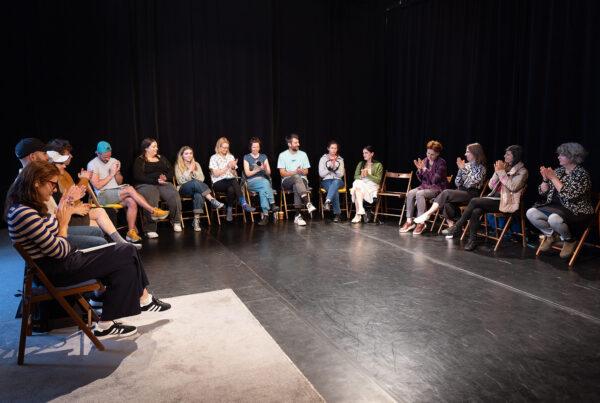By François Fogel
Through the principles it defends, the report “A National Strategy for Cultural Health – Promoting and sustaining the cultural and artistic development of children from birth to 3 years of age in the bond with their parents“, submitted to the French Ministry of Culture by psychoanalyst Sophie Marinopoulos last June, opened the way for further progress in taking early childhood into consideration in public policies. Its main idea, the notion of “Cultural Health”, refers to the need for cultural and artistic education, contributing not only to the development of the baby, but also to the quality of the parent-child relationship, both within the family and in everyone’s access to a quality social life: “(…) There is an urgent need. Urgency to substantially re-nourish our toddlers. As post-war children were fed milk, the babies of hypermodern society must be fed with this symbolic milk that is the human bond. It is not with objects that the baby wants to communicate, but with other subjects, who must offer him real cultural food.”
The report has, since then, been completed by a practical notebook. After a reminder of the main arguments in favour of artistic and cultural education, but also of a strong link to nature for the toddler, and for the parent-child relationship, this booklet offers, in a few pages, a summary of the report, and presents its recommendations, whose global approach must be highlighted: cultural, health, solidarity, urban planning and environmental policies. In addition, there is a catalogue of exemplary initiatives in the regions and abroad, with no intention of being exhaustive, a glossary, proposals for reference frameworks for reading and performing arts, and a bibliography.
The excerpt we propose here is the translation of the “Charter of Cultural Health”, an ambitious proposal with a universal vocation.
You can download the complete notebook (in French) here: http://www.scenesdenfance-assitej.fr/wp-2016/wp-content/uploads/2019/09/Eveil-culturel-artistique-2019.pdf
Please, feel free to use Deepl online translator to translate it in your own language.
“Charter of Cultural Health”
In addition to post-natal first aid, nutrition counselling and intake programmes in charge of diseases, we would like to see in all health advice collections – country health reports, national recommendations of public health, but also major World Health Organization texts – a section aimed at promoting the awakening of the toddler by highlighting its benefits in terms of overall health.
Cultural Health thus hopes to have our human specificity recognized.
We define the general framework of Cultural Health through the following twelve articles:
Article 1
Cultural Health allows the awakening of the child to be seen as a condition of his equilibrium: awakening is humanizing.Article 2
Cultural Health promotes the recognition of the human child as a relational being with an appetite to communicate.Article 3
Cultural Health takes into account the vital need of the young human being to be inscribed in a narrative fabric that opens him to life.Article 4
Cultural Health argues that sensory, emotional, gestural, bodily and linguistic expressions are similar to artistic expressions in their own right, bearing meaning and supporting the living part of the subject.
Article 5
Cultural Health establishes the universality of the needs underlying it.
Article 6
Cultural Health includes the civilizational dimension of its exercise.
Article 7
Cultural Health recognizes that artists have a major role to play in promoting Cultural Health programmes for children.
Article 8
Cultural Health recognizes professionals of childhood as privileged interlocutors of children and their parents.
Article 9
Cultural Health affirms that self-knowledge and the recognition of others requires a growth process that brings about personal appeasement and social pacification.
Article 10
Cultural Health is multicultural and recognizes the nourishing contribution of each culture to the development of children.
Article 11
Cultural Health has a central place among the cultural rights capable of breaking down the barriers between the cultural world and the social and medical world.
Article 12
Cultural Health, by calling for awakening for all, fights against inequalities and exclusions.



